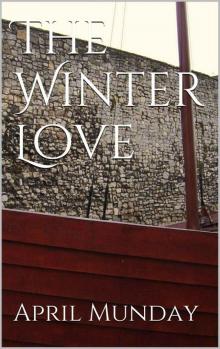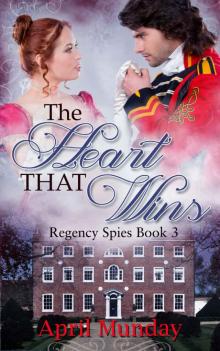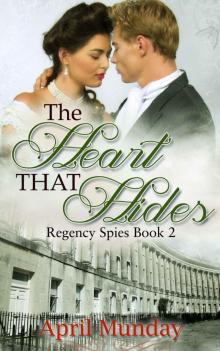- Home
- April Munday
The Heart That Wins (Regency Spies Book 3) Page 10
The Heart That Wins (Regency Spies Book 3) Read online
Page 10
“I intend to marry her.”
John knew he was staring; but he could think of nothing to say or do. If the Prussian thought to marry her, he must surely have had some encouragement from Sophia, or he had imagined that he had. John did not know how he had missed it. Perhaps he really did not understand Sophia. Of course he did not understand Sophia. He had asked her to marry him at the most inappropriate time possible. She had been in love with another man. His heart stopped at the thought that she might actually be in love with the Prussian.
“I can see I have surprised you,” said Franz when John said nothing, “but she is a beautiful young woman with a very good reputation.”
“And what of love?” asked John, when he could finally control his mouth.
“I do not believe I wish to discuss my feelings with you.”
“Of course, but what of her feelings?”
John saw the hesitation with some relief. He had not been wrong; even the Prussian did not believe she loved him.
“She is fond of me, at least.”
“Fond! She was fond of her dog, but she wasn’t ever going to marry him.”
“You try to make me a figure of fun!”
“No, I’m trying to work out why you’re here.”
“I want you to tell Sophia to accept my proposal, of course.”
“What?”
None of this was making any sense. Surely Franz knew Sophia well enough to know that if Sophia had to be persuaded to marry him, she did not love him and, if she did not love him, she would not marry him. She had been fond of John when she had turned him down. Fondness was not enough, he thought ruefully, not for Sophia.
“You can’t marry her, or even be her friend anymore. I don’t understand why Edmund has allowed you to see her, but since he has, you can support my proposal.”
Despite his supreme efforts at self-control, John clenched his right hand into a fist. Recognising that he had wanted to punch Franz since the first time they had met, he forced his fingers to uncurl. This was not how he dealt with problems. He had never had to fight so hard to control himself as he did now. He tried to see this as a diplomatic mission. For the life of him, though, he could not work out which of them had the more powerful position, but he knew he could not support Franz in his objective. Nor could he work out what the other man would accept in its place.
Franz was right about one thing; Sophia had to marry. She had no brothers with whom she could live and she could not stay with Edmund and Mary forever. John doubted she would allow him to support her, although he could do so easily. They had never spoken of money. He had always assumed they would marry, so she would have no need of a private income. He had no idea how much money she had or how much she would have when her father died. John did not think she could be persuaded to take a position as a companion to his mother.
He tried to view the Prussian objectively as a suitor for Sophia.
“What do you have to offer her?” he asked calmly.
“Then you really mean to keep away from her?”
“You obviously know my reputation. Would a man who had any regard at all for Miss Arbuthnot wish her to be associated with that?”
“I don’t think anyone expects honourable behaviour from you.”
“I suppose not, yet it seems that I can be honourable where Miss Arbuthnot is concerned.”
The Prussian was taken aback, but recovered himself quickly.
“Which makes me believe that you still have some hope...”
“No,” interrupted John, “I have no hope at all.”
It was true. There was no hope for him, not with Sophia.
“Yet you came into the house.”
That had been a mistake and he had known it at the time.
“Sophia invited me and Edmund pressed me to stay.”
“You did not have to accept.”
Now John did smile.
“Then you don’t know Edmund.”
“I know Edmund very well.”
John was beginning to doubt even this. He settled on a reason that would satisfy no one who really knew Edmund.
“He feels a sense of duty to my mother.”
“Lady Caroline, yes...”
The pause was suggestive.
“Go on,” said John, not bothering to hide the threat in his voice.
“Do I need to?”
Franz’s expression was bland, but John read the tension in his body.
“Apologise.”
“No.”
“Then I must call you out.”
This did not seem to be what Franz was expecting, for he blinked.
“You challenge me to a duel. You? You are the least honourable man in Brussels.”
“You insulted my mother, what else did you expect?”
John was convinced that the Prussian had expected something else entirely, although he did not know what it was.
Franz straightened.
“Very well. If you would send your second to me, we will make the arrangements.”
“You know very well that no man will be my second, for I would tell no one the cause of the duel and they would think I fight to defend my own honour, which cannot be defended.”
John could not even imagine telling anyone that his opponent had suggested that his mother was the lover of her brother’s closest friend.
“Then we will fight without seconds.” Franz considered for a moment. “Tomorrow morning, then?”
John nodded.
“It is for you to choose the weapon,” prompted Franz.
“Swords.”
“May I suggest the woods to the south of the town? There is a clearing half a mile past the first fork in the road.”
“I know it. What about a referee, a doctor?”
Franz shook his head.
“Just the two of us, I think.”
“Agreed.”
Franz bowed.
“We will meet again at dawn.”
John barely slept. Despite going over the conversation many times in his head, he did not see how he could have acted differently. Franz had goaded him to fight, but had not expected the challenge to a duel. Had he thought John would fight him there in his room? Quite what he had thought he would gain from such a fight was not immediately clear. If his ultimate aim was to marry Sophia, the easiest way to remove John as a rival would be to tell Sophia exactly why John had his reputation. That would immediately rob her of any feelings of friendship she still had for him. Surely the Prussian had already done that. Hope, ever reluctant to die, fluttered momentarily to life as he thought that perhaps Sophia’s friendship had proved resistant to even this.
Clearly, she had given Franz the impression that some affection for her former friend still remained, or he would not have needed to come here to ask for his support. For a moment John allowed himself to wonder what Sophia’s feelings for him might be. She had not loved him when she had turned him down, but she had treated him warmly when he had escorted her to the Finches’ house, as if she would be happy to continue their friendship. There could be no hope of that now. She must know about the girls. Franz would have made sure of that. He considered allowing the Prussian to kill him tomorrow. As usual he assessed his death by whether or not it would help Sophia. His death at Franz’s hand would ensure she never married the Prussian, which had a great deal to recommend it. It was not just jealousy that made John conclude that Franz was not worthy of Sophia. The Prussian’s behaviour the previous evening had not been honourable. Sophia’s husband must be a man of good character. No one he knew was good enough for her.
There was little point in wondering about Franz’s motives; the only thing to think about was getting through the duel, preferably without killing Franz.
He had no way of knowing how good Franz might be with a sword, but the man had survived for some years as a spy. John assumed that meant that he was good at defending himself at least.
John had not fought a duel before, despite the many provocations. Pe
rhaps Franz had considered himself safe insulting him. John had had no wish to defend his own honour, but this was different. His mother was above reproach and Edmund’s friendship with her had caused no comment in London, even after the death of his first wife. John had the advantage of knowing how much his mother loved his father. The simple reason why there had never been any gossip about his mother and Edmund was that there was nothing to gossip about. Edmund’s own reputation had barely been dented by the rumours about him and Louise Favelle that had suddenly started up. John had done his best to quash those rumours; it was inconceivable to him that the man had taken her as his mistress. He might have been besotted with her for a few weeks, but the idea of him taking such a woman as a mistress was ridiculous.
John gave up all attempt at sleep and rose at three in the morning. Having lit a candle, he started cleaning his sword and everything metallic on his uniform. When the sun came up, he wanted Franz to be blinded. For the first time he was glad that his night-time activities meant that he could not keep a servant. The effort of preparation took his mind off the coming trial. Duels were stupid and unnecessary. Honour was important, but he did not think it required anyone to die. Perhaps it would have been better to have fought Franz there and then.
Half expecting to meet Franz on the road, he set off for the appointed place. He had left letters to his mother, Edmund and Sophia in his room. The last had caused him much soul-searching, but he had told her the truth of it, then sealed it inside the letter to Edmund. He had also told her that he loved her and regretted any pain he had caused her. Even though he was not sure of her feelings, he had enclosed a lock of his hair in the letter. She might want to remember their friendship, even if she chose to forget that he had loved her.
The sun was starting to rise as he reached the clearing, but it was obscured by cloud and it seemed they might have to wait some time for enough light. At least it was not raining.
Presently he was joined by Franz, followed very shortly by a third person.
“You said no seconds,” he shouted at Franz as he recognised the third man, not sure whose betrayal upset him the most.
Franz turned to look at the man behind him.
“I did not invite him.”
“I followed him,” said Edmund as he joined them in the middle of the clearing. “Franz is not an early riser, nor is he quiet, so I wondered why he was leaving the house at this time of day with his sword buckled on.”
“It would have been polite to ask me.”
“You’re my guest. It would have been polite to tell me.”
He looked from one to the other.
“You’re fighting without seconds or a referee. Why?”
“No man would be my second.” said John.
“I would. Surely you know that.”
Edmund seemed disappointed, but John was relieved that he had confirmed what John had suspected.
“Thank you, but you can’t.”
Franz had insulted Edmund as much as he had insulted Lady Caroline. John could not have asked Edmund to be his second without telling him the reason for the duel and it was unthinkable that he should embarrass them both by doing so.
“I’m not without experience. I’ve stood beside your uncle more than once,” said Edmund.
There was a time when this would have surprised John, for Edmund was a Quaker, but now nothing the other man could tell him would surprise him.
“It’s not that, truly.”
Edmund looked at Franz then returned to John.
“You’re the injured party?”
Edmund became brusque again.
John nodded.
“Won’t you apologise, Franz?”
“No, I stand by what I said.”
“This is foolishness,” shouted Edmund. “Aren’t you both needed to stop Bonaparte? Must you do his killing for him?”
He urged his horse away from them and walked it slowly around the clearing. John and Franz watched him, then John noticed that the clouds were thinning. They would have to start soon.
When Edmund returned he was a little calmer.
“Is this about Sophia?” he asked.
“No,” said Franz.
John shook his head. He, at least, would not lie to Edmund. Whatever John’s reasons were for this fight, Franz’s were entirely to do with Sophia.
“You wouldn’t fight to defend your own honour.”
Edmund looked squarely at John.
“No,” agreed John, not looking away from him.
“Then, if it’s not Sophia...”
“Edmund, please, you have delayed us long enough. Rest assured, this is a matter of honour. I know you don’t approve of duelling any more than I do, so please accept that I did not challenge him on a whim.”
Edmund nodded.
“I have no wish to write to your mother with news of your death… or your uncle.”
His voice was so quiet that John knew that Franz could not have heard.
“Is he that good?”
“What? Oh, I don’t know. It’s just...”
He straightened in the saddle.
“I’ll wait outside the clearing until it’s over.” He turned towards the Prussian and raised his voice. “But Franz, our friendship is over.”
“Edmund, wait!”
Franz began to turn his horse to go after the older man.
“Don’t be an idiot,” said John. “He’s worked out why we’re here.”
“How? You didn’t tell him, did you?”
“Of course not. It’s not hard to follow his reasoning. He knows he’s the one man in Brussels I could ask, would ask, to be my second, yet I didn’t ask him.” At Franz’s dubious expression, he said, “Accept that I would have asked him, knowing that he would have agreed. Because I didn’t, he knows that he is involved somehow. He knows I would not fight a duel on his behalf. We’re not that close and he can fight his own duels if he wants. I told him it wasn’t Sophia’s or my own honour that was at stake, so it’s someone else’s who is very important to me.”
“Why did you tell him those things?”
“Because I find, rather belatedly, that I value his good opinion of me and I don’t want to lose it by lying to him.”
“He means it, doesn’t he?”
“That your friendship is over? I think so.”
John was not sorry. Whatever happened, Franz would move out of Edmund’s house and Sophia would only have to see him if she wanted to. If she read his letter, he doubted she would want to.
“We should begin.”
Franz looked once more in the direction in which Edmund had ridden, then dismounted. They tethered the horses on the edge of the clearing. John removed his jacket; it had done its work and would only get in the way while he was fighting. Franz did the same. John watched him, trying to gauge his strength and agility. The Prussian moved well. John preferred to fight an adversary who was able to fight back. Then they stood facing one another.
“First one to draw blood,” said John.
Much as he wanted to kill Franz, it was not something he wanted on his conscience and Edmund’s words about doing Bonaparte’s work for him had made an impression. For that reason he had no wish to die here. The Prussian hesitated, then nodded.
John thought the older man would be quicker than him, for he was thinner and more intemperate. They were of a similar height, but John guessed that the Prussian had less experience since he was not a soldier, but what did he know of spies and their abilities? Despite their agreement to stop at first blood, there was still a good chance that one of them would die here in the clearing, or later from their wounds.
John raised his sword in salute and Franz responded. Then they began. It was slow enough at first as each tried to gain the measure of the other. Franz proved himself to be calmer than John had expected. John doubted it was uncertainty on the Prussian’s part. Deciding that he would understand more of Franz’s ability if he attacked, John got in close and lunged. To his surprise, Fran
z’s parry was clumsy and John’s blade ripped through his shirt.
Before John could give it too much thought, Franz made his own attack. This had more finesse, but no force. John parried it easily and danced out of the way of a possible follow up, just in case this was all an act. Even before he had regained his balance, he changed direction and aimed under his opponent’s guard. This was a more dangerous attack. Franz whipped his blade round to hook it under John’s and only just avoided being cut.
Now John saw that he could end this quickly. The only question was, how much did he want to hurt Franz? The answer was that he wanted to hurt him a great deal, but the greater insult by far would be to hurt him a little.
He parried Franz’s next, more desperate attack, then stepped to one side and raised his sword towards the other’s sword arm. Franz must not even have felt the nick on his arm, for John had to lower his sword and shout for him to stop.
“Why do you want to stop?”
“I have drawn blood.”
“You lie. I felt nothing.”
“Nonetheless, if you examine your arm...”
Franz stretched out his arm and saw the thin red line beneath the slit in his sleeve.
“That’s a scratch. It doesn’t count.”
“We agreed first blood.”
John fought to keep his anger in check.
“You insult me.”
John wiped his sword and returned it to its scabbard.
“Perhaps, but the duel is over. I’m going to ride back to Brussels with Edmund.”
He pulled on his jacket, mounted his horse and left the clearing without a backward glance.
“You didn’t kill him did you?” asked Edmund when John joined him.
“No. We agreed first blood. He fences very badly.”
“Does he? I’ve seen him handle a sword and he’s very matter of fact.”
“You’ve never fenced with him?”
This was a surprise.
“No. You suspect he fought badly on purpose?"
“I did until I drew blood. I don’t think he intended to lose.”
John was not sure about this, for Sophia would be sympathetic to a wounded man.
“He has saved my life at least twice.”
“I’m sorry.”
“It’s not just the insult, he lied to me as well. We have been friends too long for that to be necessary.”

 The Winter Love
The Winter Love The Heart That Wins (Regency Spies Book 3)
The Heart That Wins (Regency Spies Book 3) The Heart That Hides (Regency Spies Book 2)
The Heart That Hides (Regency Spies Book 2) The Heart That Lies
The Heart That Lies